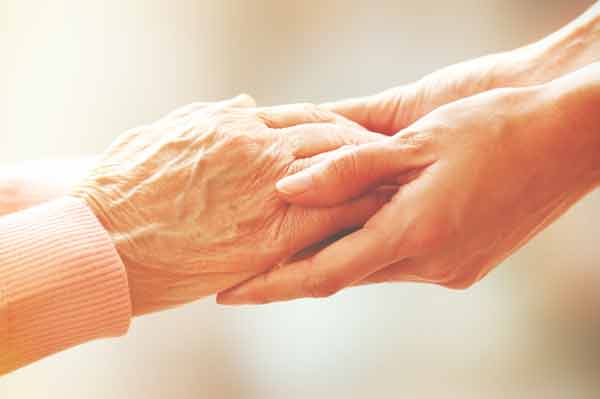Becoming a Caregiver After the Death of a Parent
Posted: February 18, 2020
 Becoming a Caregiver After the Death of a Parent
Becoming a Caregiver After the Death of a Parent
The death of a parent is a profound loss that can change your daily life and family responsibilities.
Neurological
changes to the brain after a parent’s death can happen over a course of weeks, months or longer. But other changes may be thrust upon you suddenly, even while you’re still grieving.
When the deceased leaves behind a spouse, for instance, you may find yourself jumping headfirst into the role of caregiver for an aging parent—often with little assistance and even less information.
It’s a common scenario. In fact, nearly a third of Americans will find themselves caring for a parent, spouse or other family member during their lifetime, according to estimates from the
National Alliance for Caregiving.
What Does a Caregiver Do?
Not every caregiver performs the same duties. While some may play a supportive role, helping their loved one file their taxes, plan their estate or mow their lawn on occasion, others take on more demanding everyday duties. These include helping their loved one in and out of their seat, driving them to errands and appointments, administering medicine, advocating on their behalf, brushing their teeth and more.
Like most caregivers, you likely find yourself performing a mix of both easy and difficult tasks; ones that bring you closer to your parent, and others that you maybe dread.
Taking on a slew of new responsibilities at once while simultaneously trying to manage your grief can
take its toll on both your physical and mental wellbeing. Arming yourself with information and support can help make the transition less stressful, but too often, new caregivers don’t know where to begin, or who to turn to.
Thankfully, National Caregivers Day is helping to shine a spotlight on these challenges.
What Is National Caregivers Day?
National Caregivers Day is a day of observance to raise awareness of the millions of Americans who selflessly work to care for a loved one without pay, and often times without any help. It’s held annually on the third Friday of February. In 2020, National Caregivers Day falls on February 21.
Why You Should Observe National Caregivers Day
Caregiving can have its joys, bringing child and parent closer together and forging deep bonds that strengthen the relationship. But it is not without its hardships.
Watching your parent’s health decline as you do everything you can to keep them safe can be overwhelming and dredge up difficult emotions. This is a natural reaction, but sometimes we feel guilty for our sense of burden.
The average caregiver spends more than 24 hours a week caring for their loved one— this is not an insignificant amount of time. It’s also not uncommon for some caregivers to devote more than 40 hours, amounting to a full-time job in itself. Unfortunately, this means many caregivers in this situation set aside their personal wellbeing and put off caring for themselves, leading to long-term health and relationship consequences.
This is the reason National Caregivers Day is so important. Whether or not you are able to make time to do something special for yourself on this day, it’s a good reminder that everyone needs to step away once in a while.
Local Support for Caregivers
Take a look at the local resources below and pull out your calendar. Pencil in for time to do what makes you happy, healthy and recharged—whether it’s 10 minutes every day for some meditation, a weekly support group meeting or a regular monthly massage.
Family Caregivers Center of MercyThe Family Caregivers Center of Mercy in Cedar Rapids is an exceptional resource. Here, you’ll find information about caregiving, get answers to your questions from the experts, and support from other experienced caregivers. You can also attend events and educational seminars, participate in activities with or without the care receiver, and connect with need-based resources for caregivers available in your community. No purchase or insurance is required to utilize these services.
Location:
Mercy Campus 901 8th Ave. SE
Cedar Rapids, IA 52401
Adult Day Health CentersAdult Day Health Centers provide a supervised atmosphere for adults who require support and
supervision to help them maintain their independence.
Visitors are provided with meals and a variety of optional activities, giving caregivers a chance to run errands, go to work or care for themselves while their loved one is in capable hands.
If you’re interested in this service, you can arrange a free visit day at the following facilities to try it out:
Locations:
Milestones – Cedar Rapids1725 O Ave. NW
Cedar Rapids, IA 52405
(319) 398-3647
M-F 6:45 a.m. - 5:45 p.m.
Milestones – Marion1080 Cardinal Dr.
Marion, IA 52302
(319) 373-3494
M-F 7 a.m. - 5 p.m.
Pathways – Iowa City 817 Pepperwood Lane
Iowa City, IA 52240
(319) 339-6162
M-F 7:30 a.m. - 5 p.m.
Caregiver RespiteThe Respite Program from UnityPoint Health – Abbe Health – Aging Services assists caregivers by offering a temporary reprieve from some of their daily caregiving duties. In-home providers assist with tasks like light chores, meal prep and personal care, allowing the caregiver to focus on other responsibilities, or just take a well-deserved break. Hourly rates for this service vary by provider, and financial assistance is available for eligible families.
Location:317 7th Avenue SE, Ste. 302B
Cedar Rapids, IA 52401
319-398-3644
Finding Time to Grieve
It’s important that as you’re taking on these new responsibilities, you take the time to acknowledge your grief. It is absolutely normal and 100% OK to struggle with this.
Remember that you are not alone. Visit our
Grief Resources page and connect to the help that is waiting for you: Grief Resources.